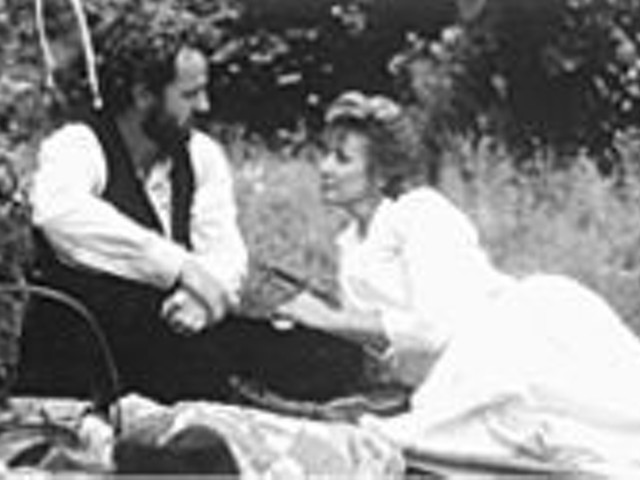Not exactly a roll call of high art, but Veber, firsthand, is better than the shadow of Hollywood mediocrity he casts. Probably the American filmmaker he most resembles is Blake Edwards in a less slapstick mode, though Veber's touch isn't quite as heavy. He's a highly skilled craftsman of bourgeois farce -- stuff just scandalous enough to wow the middlebrows without turning them off. That's not meant to denigrate Veber: It's a tough balancing act to pull off, and when it succeeds, the result is a movie that anyone other than the most uptight, in any direction, can enjoy. You can take your mom to it without being embarrassed or bored.
The director is in fine form with The Closet, an expertly acted divertissement that may well be headed for a Yank incarnation within the next few years. Auteuil plays Pignon, a divorced Milquetoast accountant for a company that makes condoms. When he loses his job, he's shattered because he won't be able to go on paying alimony, the only connection he still has with his indifferent ex-wife and increasingly distant teenage son.
Pignon is considering a leap off the balcony when his neighbor, a retired "industrial psychiatrist" (the excellent Michel Aumont), talks him out of it. The neighbor proposes, instead, a scheme to help Pignon get his job back: He will deliberately spread the rumor that Pignon is gay, and the company will be so terrified of seeming discriminatory -- and of alienating an important customer base -- that they'll keep him on at all costs.
Pignon is a quiet, close-to-the-vest type, and his physical manner is sort of prissy, which is what allows his colleagues to buy the gag. All sorts of Gallic wackiness ensues.
Subtextually, this premise is, of course, one more variation on the Straight White Whine. Vaguely less discriminatory social policies toward women, minorities and gays translate, in the straight white mindset, to the lavishing of "special rights," all sorts of indulgent perks and advantages on these groups. Other examples of this resentment have made it to the screen already -- you may remember, with a shudder, super-Caucasian C. Thomas Howell painting his skin dark to get into Harvard Law School in Soul Man in 1986, a film that did not, alas, end with a lynching.
But with The Closet, Veber makes his similar, and similarly dicey, concept work. He's far too humane -- and far too canny -- to be unaware of the pitfalls in the material, and he shapes the story in ways that head off objections. The kindly neighbor, for instance, notes that he was fired 20 years ago for the same reason Pignon's being kept on.
Pignon's co-worker Santini (Depardieu), a big macho ape who loves rugby and thoughtlessly tosses around homophobic jokes and racist epithets, is made the butt of a prank by another co-worker, Guillaume (Lhermitte), who convinces Santini that it's in his interest to make friendly overtures to Pignon. These Pignon understandably interprets as gay advances. Amazingly, Veber is able, thanks to Depardieu and Auteuil's remarkable acting rapport, to take this strand in an unexpectedly touching -- and still very funny -- direction.
Other subplots spin off in other directions: A female colleague (the charming Michèle Laroque) suspects Pignon's ruse, and Pignon's son finds his dad interesting, now that he thinks he's gay. Pignon also encounters gay-bashing, and this development is the only one that feels jarring. Veber just can't give it the jolly, lighthearted tone that characterizes the rest of the film. The farcical comeuppance he gives the brutes who rough up Pignon isn't nearly sufficient as comic/poetic justice.
But even if these scenes misfire, Veber was smart to include them. Without at least a nod to the dangers of being gay, The Closet would lack that touch of gravity that the best farces have.





